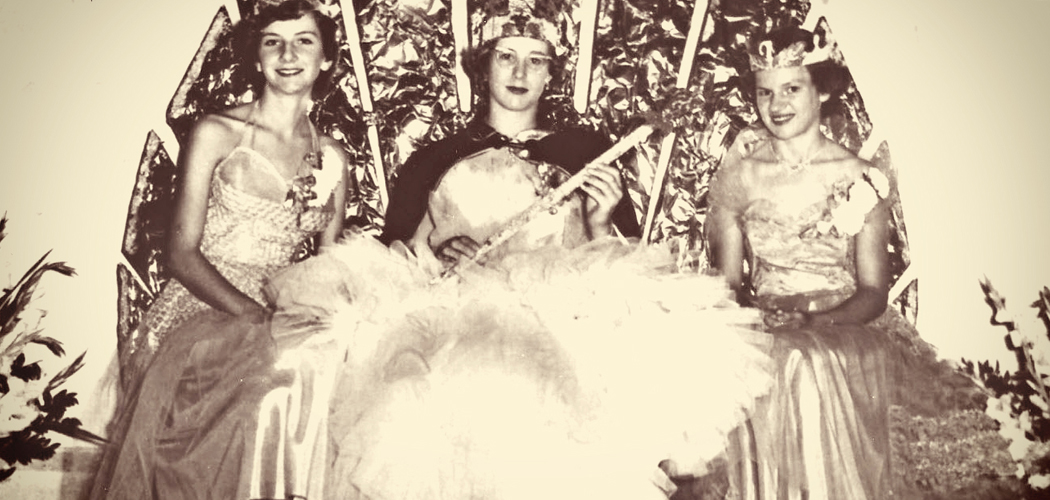[title subtitle=”words: Marla Cantrell
Images: Mark Mundorff and courtesy Tontitown Historical Museum and Shiloh Museum of Ozark History”]
In the summer of 1954, on a muggy August night in Tontitown, Arkansas, Antoinette Zulpo (now Pianalto) became a queen. The dress she wore was white and ruffled; her jewelry – a necklace, bracelet, and earrings – was costume; and her crown was cardboard, made by a man named J.H. Posey, who could do wonders with a little glue and a lot of sparkle. When her uncle, Mayor Harry Sbanotto, held the crown aloft and placed it on her head, she was the kind of happy songs are written about.
Her coronation as Queen Concordia was the highlight of the Tontitown Grape Festival, hosted by St. Joseph’s Catholic Church. The festival had begun as a day of thanksgiving by Italian immigrants who came to the area beginning in 1898, bringing with them their expertise for growing grapes and a belief in the American Dream. As the years passed and the vineyards flourished, the celebration grew, and more and more people showed up, due in large part to the cooking skills of the ladies. No one could get enough of their Italian food.
Antoinette doesn’t remember her decision to run for queen. “It was just expected, I think, since I grew up helping with the festival. It takes a lot of work to get ready. We’d start in July making the spaghetti, and when you’re really small you show up with your mother and do things like carry the eggs and flour to the women of the church. There’s a lot of mixing and rolling out the dough, and cutting it into strips. You get to visit. There’s a lot of talking and laughing and catching up. There’s so much tradition in it; there’s really nothing else like it.”
There was also nothing else like being queen, although it was not an easy task. The contestants sold chances on a big-ticket item. In recent years the prize has been a pickup truck, (this year it will be a 2014 Dodge pickup from Everett Chrysler Dodge) but in 1954, it was a brand new black-and-white TV. Since Tontitown was such a small place, it was imperative that the girls traveled outside the area to find enough buyers. The cost of each raffle ticket was twenty-five cents.
Antoinette, who was fourteen at the time, had a hurdle to overcome; her parents didn’t own a car, so she had to depend on others to chauffer her. “I had people who would come pick me up at eight in the morning and take me back home at night. I had a friend who was an assistant coach at the University of Arkansas, and he took me there. I had a lot of people that were really good to me. Each girl had sponsors, and mine were Richard and Nettie Mae Ardemagni, who owned the Tontitown Mercantile Company. They were so good to me. Nettie Mae would take me to sell. We went to other churches, as far away as Harrison, and I’d sell chances after church.
“On a certain Sunday evening, they counted the votes. I’d sold $1,200 in chances.” Antoinette laughs. “That’s a lot of tickets.”
In fact, it’s 4,800. All bought from Antoinette, including the winning one that was purchased by the aunt of the man who would soon marry Antoinette’s older sister.
With her title secured, she started getting ready for her coronation. Again, her sponsors stepped in. “Richard gave Nettie Mae $200, which was a lot of money at that time. He said, ‘Take her shopping and don’t come home with a dime.’ She bought my dress, which was beautiful, all my undergarments, my shoes. She bought my jewelry, a matched set of necklace, bracelet, earrings. We had a few dollars left over and she said, ‘I can’t go home with this money.’ She asked me what I wanted, and I said, ‘I’d love a pretty rosary.’ And she got me one.
“The night I was crowned, they had part of a circus come to town. They had an elephant, and somebody wanted me to ride in on this elephant up to the stage. And I said, ‘I’m not getting on that dirty elephant in this white dress!’ I was the type that if I was told to do something, I’d do it. But I drew the line there.”
Antoinette is laughing as she tells the story. At seventy-four she is still beautiful, still carries herself regally. When she talks about Tontitown, there is so much love in her voice it feels like listening to music. Each year, she says, her mother made her three dresses to wear during the festival. Looking back, she realizes they were actually clothes for the new school year, but it never once occurred to her then.
Her memory reaches so far back that she can tell you how the spaghetti dinners came to include the now famous fried chicken. “Men would go around and ask for donations and then some women would donate tea towels, some would donate eggs for the spaghetti, and a lot of people would donate live chickens that they’d put in these coops, and that’s how it came about: spaghetti and chicken. The women would go up there and scald the chickens and pick the chickens and dress them. One of my first jobs was to clean the gizzards.
“We served maybe two to three hundred people a night. Now we serve several thousand a night. We have a man who comes and fries our chicken now. But the women still make the hot rolls every day. They make the sauce in a pot that holds ninety gallons. It’s so tall they’ve made us a couple of stools to stand on to stir it with aluminum boat paddles. We make five pots starting on Tuesday and going through Saturday. We make twenty-two batches of hot rolls a day. We have a machine that chops the lettuce. We go through about twenty cases of lettuce a night.”
In all these years, Antoinette has yet to miss one night of the yearly Grape Festival. She gestures with her hands, holding them out in front of her. “You can’t miss the festival,” she says, emphatically.
It’s been sixty years since her uncle and mayor of Tontitown crowned her Queen Concordia (named for the Concord grape, which flourished in the Arkansas soil). She taps her lip with her index finger, and then excuses herself for a moment. When she comes back she’s carrying a brass trophy that was given to her the day she relinquished her reign to the new queen, Nora Piazza. “Governor Orval Faubus presented me with this trophy on August 25, 1955,” she says.
And while meeting the governor was thrilling for the fifteen-year-old, there was someone else in the crowd who stole her heart. “My mother was sick. She had cancer at the time, but I didn’t know it. And still, she showed up to see me give up my crown, and then she had to go right back home. That meant the world to me, that she came to see me that night.”
That year was heartbreaking for Antoinette. Her dad, who’d been bedridden from a stroke for five years, died of a heart attack. Her mother succumbed to the cancer, dying before Antoinette turned sixteen. “They passed away eight months apart,” she says.
Soon after, Antoinette went to live with her older sister. She graduated, moved to Tulsa, and fell in love with Richard Pianalto, who also grew up in Tontitown. Eventually they moved back, had a farm, and raised their children. At the center, always, was Antoinette’s faith and devotion to St. Joseph’s Catholic Church.
There is a guide that’s given out each year at the Grape Festival. In it is the history of the area, the memories of the earliest residents of Tontitown, each a celebration of their Italian heritage. An entire page is devoted to the former queens, with a list of surnames such as Fiori and Sabatini, Mantegani, Franco. And of course, Pianalto and Zulpo. Antoinette is proud to be among them. Her own father came to Arkansas from Italy, as did both her mother-in-law and father-in-law.
“The Italians who came here were such hard working people,” she says, “and this place looked a lot like Italy, which is why they thought the grapes would do well here. They had a hard time for a while; most could only speak Italian, and it took some of the people here a while to accept them. My mother-in-law remembers seeing the Statue of Liberty from the boat she was on when she arrived. She was five.” Antoinette smiles, “Can you imagine what an impact that made?”
In a few more days Antoinette will join the other volunteers from her church to start making pasta for this year’s festival. She’ll sign up to work in the dining hall on Friday night, and wait for the crowds that line up well before the doors open, ready for a homemade Italian meal that’s second to none. She is already excited, so happy to be part of a tradition that’s been around for 116 years. So proud to be part of a community that opens its doors and has a party every August, honoring the good, strong people who took a chance on America and made Tontitown their home sweet home.
[separator type=”thin”]
116th Tontitown Grape Festival
August 5 -9
Free Parking
Free Admission
Free Nightly Entertainment
Grape Stomp Tuesday & Wednesday
Spaghetti Dinners served Thursday-Saturday
Arts & Crafts Open Thursday-Saturday
Carnival Every Night w/Armband Specials
116th Queen Concordia Crowned Friday
Run for the Grapes 5K Walk/Run & Kids Fun Run Saturday
tontitowngrapefestival.com
Find them on Facebook — Tontitown Grape Festival




